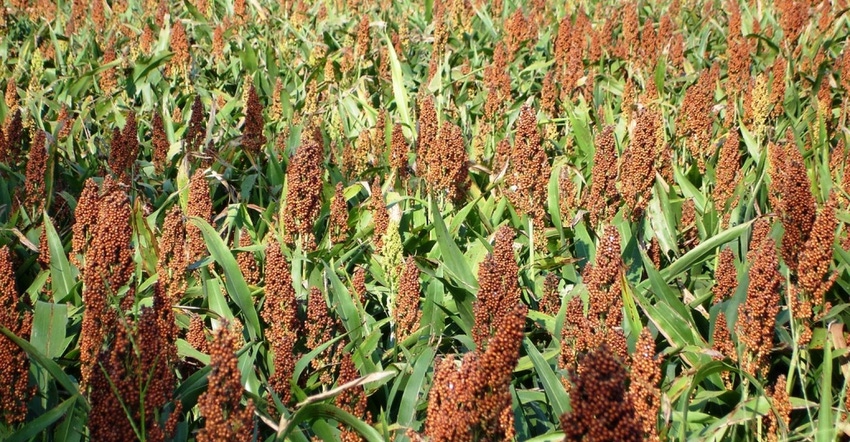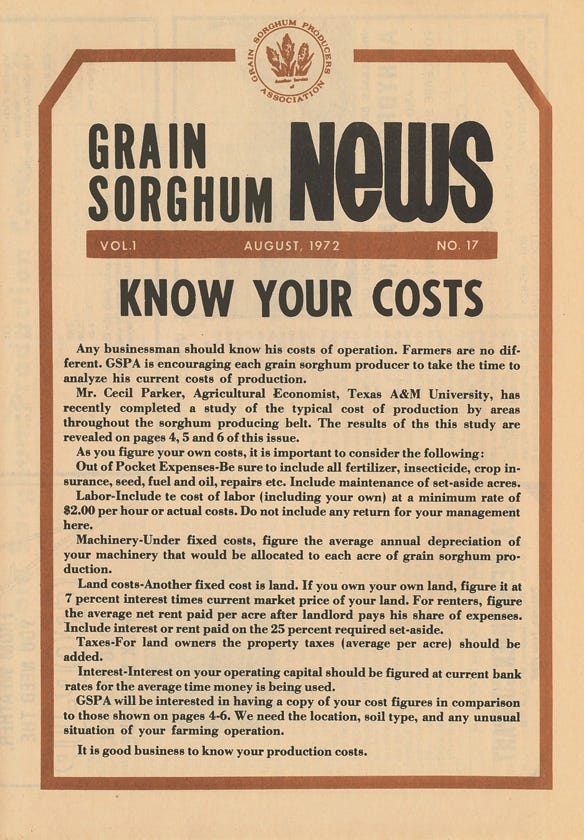December 6, 2019

I know. I’m a broken record. From marketing, to ethanol, to trade, to sustainability, I’ve covered it all — three or four times each. This month will be no different, but I’m relieved to report I’m not alone! As it turns out, agriculture has been fighting many of the same issues for five decades.
The Team Sorghum office here in Lubbock is just over 21 years old, so lately, we’ve been doing some housecleaning. The utility closet next to my office had its turn to be cleaned a couple weeks ago, and we found a veritable treasure trove of historical information on the organization and the sorghum industry. One such gem was the seventeenth edition of the first volume of Grain Sorghum News.
Dated August 1972, the edition’s headline was familiar. “Know your costs,” it proclaimed, exhorting sorghum farmers to take a deep dive into their current costs of production. Other subjects covered in the issue included farm policy (and specifically, potential base acre as well as loan price changes), development of international swine and other end-uses markets, chemical registration cancellations by the U.S. Environmental Protection Agency, growing insect pressure, and finally, development of recipes for the growing human food market.
While our continued struggles with the same issues may seem discouraging, I think they’re indicative of mind-blowing resilience on the part of sorghum farmers. Think about it: The problems we’re facing in U.S. agriculture are just tough to fix — we’re not doing anything wrong.

TRUE THEN, TRUE NOW: This newsletter from 1972 shows how important it was to calculate the cost of production. The same holds true today. We still need more markets and higher prices but knowing the cost of production is key to making money.

Plus, we’ve faced existential crises before, yet we’re still standing. That’s a reason to be excited, in my opinion. It doesn’t mean we should relax too much, though. Looking back through the archive, it’s been almost two years since I covered cost of production issues here, so I think now is a perfect time to revisit the August 1972 Grain Sorghum News edition’s headline story.
First, I’ll give you a little perspective. The budget featured in that story includes a breakeven price for sorghum in Kansas of $1.37, while current Kansas State University crop budgets include a breakeven price in north-central Kansas of $2.74. North-central Kansas terminals are currently bidding around $3.16 (as always, individual experience will vary), indicating profit is possible even if it isn’t likely. Conversely, the national average price received by farmers for the 1972 crop was $1.37. That’s right — the financial environment then was worse than it is today in some cases.
Again, our struggles are not new. If you’re like me, this truth is very comforting and highly motivating. After all, if Dad and Granddaddy survived, I can, too.
So, what am I doing with this newfound motivation? And more importantly, what am I urging every sorghum farmer I know to do? Hint: It includes a pencil sharpener. As always, I’m urging farmers to calculate their costs of production better than ever before — not just for the sake of performing the calculations, but rather so they can make proper capital planning decisions and know to the penny when to market their crop. With today’s thin margins, every penny counts.
There are countless considerations in the area of cost-tracking, so I’ll leave you with one related to fixed costs. In a time when many farmers are looking to grow the size of their operations to optimize fixed costs, keep in mind changes that must be made to the structure of these costs when in growth mode. If you add so many acres you need another tractor and another employee, did you really lower fixed costs? Maybe or maybe not, but you can answer this question. Sharpen that pencil and go to work.
Duff is a strategic business director for National Sorghum Producers. Email [email protected] or find him on Twitter @sorghumduff.
About the Author(s)
You May Also Like






